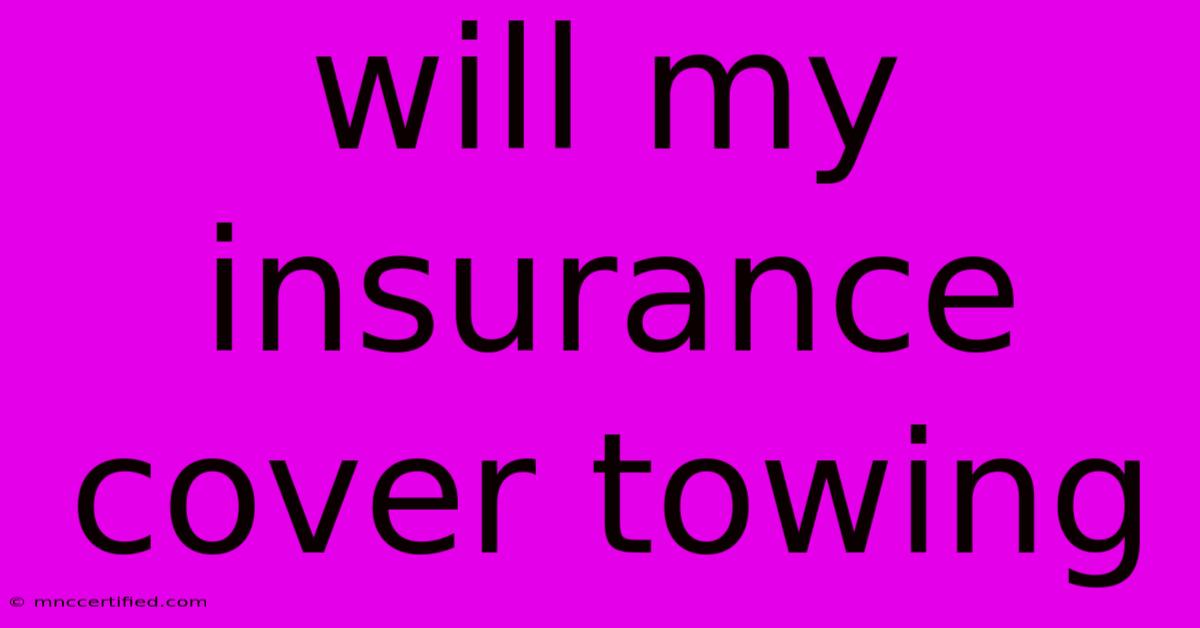Will My Insurance Cover Towing

Table of Contents
Will My Insurance Cover Towing? A Comprehensive Guide
So, your car has broken down. Frustrating, right? Now you're wondering, "Will my insurance cover towing?" The answer, unfortunately, isn't a simple yes or no. Whether your insurance covers towing depends on several factors, and understanding these is crucial. This guide will break down everything you need to know to navigate this potentially costly situation.
What Types of Insurance Policies Typically Cover Towing?
Most comprehensive car insurance policies include towing coverage as part of their roadside assistance benefits. However, the specifics vary wildly between insurers and policy types. Here's a breakdown:
-
Comprehensive Car Insurance: This type of policy usually provides the most extensive coverage, including towing. It protects you against damage caused by non-collision events like theft, vandalism, or weather-related incidents. Towing is often a standard benefit within this package.
-
Collision Coverage: This policy covers damage to your car resulting from a collision with another vehicle or object. While it doesn't directly cover towing, if your car is undrivable after a collision, towing is often a necessary part of the claims process, and your insurer will likely cover it.
-
Liability-Only Insurance: This policy only covers damages you cause to other people or their property. It generally does not include towing coverage. This is the minimum insurance requirement in many jurisdictions, but it leaves you with significant out-of-pocket expenses in case of a breakdown.
-
Roadside Assistance Add-ons: Many insurers offer roadside assistance as an add-on to even basic liability policies. This often includes towing, but it’s important to check your policy details to understand the limitations.
What Factors Affect Towing Coverage?
Even if your policy includes towing, several factors influence whether it'll be covered:
-
The Reason for Towing: Coverage usually applies to breakdowns, accidents, and other situations where your car is undrivable. Towing for routine maintenance or planned repairs is typically not covered.
-
The Distance Towed: Most policies specify a maximum towing distance. Expect limitations, and be prepared for out-of-pocket expenses if the tow exceeds that distance.
-
The Type of Towing: Policies might only cover certain types of towing, like flatbed towing for damaged vehicles. Specialized towing might be excluded.
-
Your Policy's Specific Terms: Read your policy carefully! The fine print contains crucial details about coverage limits, exclusions, and procedures for filing a claim. Don't rely solely on assumptions.
Key Questions to Ask Your Insurer
Before you need towing, proactively clarify these points with your insurance provider:
- What is my towing coverage limit? (distance and cost)
- What situations are covered by my towing benefit?
- What is the procedure for requesting towing services? (Do I need to call a specific number? Can I choose my own tow truck?)
- Are there any exclusions or limitations on my towing coverage?
- What documentation is needed to file a claim?
How to File a Towing Claim
The process typically involves:
- Contact your insurer: Report the incident and follow their instructions regarding obtaining towing services.
- Get a quote from the tow truck driver (if applicable): Some insurers require you to obtain a quote before authorization.
- Provide necessary documentation: This might include photos of the vehicle, police report (if an accident occurred), and the tow truck invoice.
- Submit your claim: Follow your insurer’s claim filing process, whether online, via phone, or by mail.
Don't Get Stuck: Proactive Steps
Being prepared can save you significant stress and money:
- Understand your policy thoroughly: Regularly review your insurance policy to stay informed about your coverage.
- Keep emergency contact information readily available: This includes your insurer's number and roadside assistance number (if applicable).
- Consider supplemental roadside assistance: If your policy doesn't offer comprehensive towing coverage, explore adding a standalone roadside assistance plan.
By understanding the intricacies of your insurance policy and following these steps, you can navigate a roadside emergency with greater confidence and minimize unexpected costs. Remember, prevention is key. Knowing your coverage beforehand is the best way to avoid costly surprises when you need towing services the most.

Thank you for visiting our website wich cover about Will My Insurance Cover Towing. We hope the information provided has been useful to you. Feel free to contact us if you have any questions or need further assistance. See you next time and dont miss to bookmark.
Featured Posts
-
Pub Petition Calls For Another General
Nov 27, 2024
-
Valdosta Insurance Valdosta Ga
Nov 27, 2024
-
Paul Bissonnette Arizona Altercation
Nov 27, 2024
-
Watch Sheffield United V Oxford Channel Info
Nov 27, 2024
-
Boyles Insurance Clearfield Pa
Nov 27, 2024